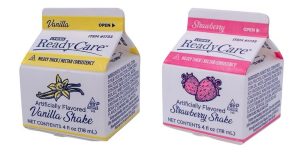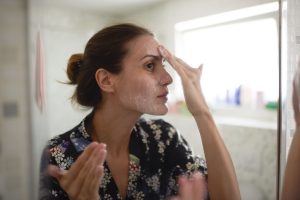:max_bytes(150000):strip_icc():format(jpeg)/VWH.GettyImages-2154879872-fe33068ee57f4e3c966734eac5d3ea69.jpg)
| Types of Retinoids | ||||||
|---|---|---|---|---|---|---|
| Retinoid | Topical | Oral | Acne | Aging | Psoriasis | Cancer |
| Acitretin | X | X | ||||
| Adapalene | X | X | ||||
| Alitretinoin | X | X | ||||
| Bexarotene | X | X | X | |||
| Isotretinoin | X | X | ||||
| Tazarotene | X | X | X | |||
| Tretinoin |
X | X | X | X | X | |
| Trifarotene | X | X | ||||
Side Effects of Retinoids
Topical Retinoids
Prescription-strength topical retinoids typically cause more side effects than OTC options and are typically worse in the first two weeks of treatment.
Common side effects of topical retinoids include:
- Burning
- Changes in skin pigmentation (coloring)
- Itching
- Skin dryness
- Skin irritation
- Skin peeling
- Skin redness
- Sun sensitivity
If you experience side effects, it is best to alter your application regimen. Applying it less frequently will help your skin get accustomed to it. It is recommended that you start applying topical retinoids every other evening or every three days, gradually increasing to every night. Applying a moisturizer afterward can help prevent irritation.
Oral Retinoids
Oral retinoids are absorbed systemically, meaning they travel through your bloodstream. This is beneficial for treating certain conditions but can cause more side effects, some of which can be severe.
Common side effects from oral retinoids include:
- Changes in cholesterol
- Dry skin and mucous membranes (mouth, lips, nose)
- Dry eyes
- Increased liver enzymes
- Joint pain
- Muscle pain
Serious side effects associated with oral retinoids include:
Other Precautions
Retinoids can make your skin more sensitive to the sun. This can cause sunburn, irritation, and damage to your skin. While using retinoids, you should protect your skin by:
- Avoiding the sun during the peak times of 10 a.m. to 4 p.m.
- Wearing protective clothing, sunglasses, and a wide-brimmed hat
- Wearing sunscreen with at least an SPF of 30
Exposure to ultraviolet light can decrease the effectiveness of retinoids. They should be applied at bedtime, except for adapalene (Differin), which can be used during the day.
Since retinoids make your skin more sensitive, it is best to avoid certain skin procedures while using these products, such as:
Oral retinoids like isotretinoin can cause severe birth defects and should not be taken by anyone pregnant. Because the risk is so high, people taking these medications will be required to enroll in the iPledge program. This program helps to ensure that pregnancies do not occur while taking oral retinoids.
If you are using topical retinoids and are pregnant, planning on becoming pregnant, or breastfeeding, you should discontinue retinoids and find a safer alternative. Speak with your pharmacist or healthcare provider for more information.
Understanding Retinol
Retinol, also known as vitamin A, is a type of retinoid commonly found in OTC skincare products for acne or aging. It is naturally occurring and can be found in plant and animal sources; however, most available retinol products are chemically made.
OTC products may contain retinyl esters, retinol, or retinal. Each of these must be converted to retinoic acid, with retinyl esters being the weakest and retinal being the strongest. Keep in mind that OTC products containing retinol are considered cosmetic products and are not regulated the same way prescription and OTC medications are.
Benefits
Retinol has been shown to improve the appearance of the skin. It can improve:
- Acne
- Fine lines
- Skin tone
- Texture
- Wrinkles
Retinol is a weaker retinoid, so results will be less pronounced and take longer. Prescription retinoids can take up to six months to work, so don’t expect quick results. However, it should result in fewer side effects. Retinol may be a better option for someone with sensitive skin or new to trying a retinoid.
Uses
Retinol is used to treat the following issues:
- Acne
- Fine lines and wrinkles
- Dark spots
Side Effects of Retinol
Retinol side effects are usually temporary and less intense than prescription-strength retinoids. You may experience the following side effects:
- Burning or stinging skin
- Dry skin
- Itching
- Peeling
- Skin irritation
- Skin redness
Summary
Retinol is a type of retinoid. It is a weaker retinoid and is available OTC. It will take longer to see changes with retinol, but it generally causes fewer side effects. Retinol may be a better choice for someone with sensitive skin.
Retinoid products are stronger and will show results quicker than OTC options. However, retinoids cause more side effects. Proper sunscreen, moisturizers, and application techniques can help minimize side effects. Retinoids may be a better choice for someone with more severe skin concerns. Both retinol and retinoids can improve the appearance of the skin, however, retinoids can also be used for other treatments, such as psoriasis and certain types of cancer.








